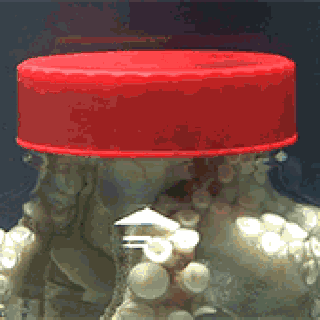Octopuses are really smart, probably the smartest species of invertebrates.
The number of neurons is an indicator of an animal's intelligence. We can compare the octopus to other animals.

As can be seen from the picture above, the number of neurons in the octopus exceeds that of many mammals, which can be used as a circumstantial evidence of its extraordinary intelligence. Of course, having more neurons does not necessarily mean being smart. For example, elephants have three times as many neurons as humans.
Tool use has long been considered a uniquely human ability, although it has since been found in many other animals, such as parrots and chimpanzees. But this ability is still seen as a sign of high intelligence. Octopuses can also use tools. Biologists have observed octopuses dragging two pieces of coconut shells from the beach to the bottom of the sea, crawling inside, closing the shells and hiding in them, waiting for food.
It can even unscrew the bottle cap like the picture below from the inside and escape.


Learning ability is also an important sign of animal intelligence. The following experiment.

The octopus in the tank on the left is a novice octopus just caught from the sea. It looked at the food contained in a glass box with a complex structure, but couldn't find the entrance, and had no choice. In the tank on the right is a veteran octopus that has been on the battlefield for a long time. It skillfully found the entrance of the box and got the food. After the novice octopus saw it, without any hesitation, he immediately adopted the same method, got into the box, and had a full meal.
In 2008, the staff at the Ocean Star Aquarium in Coburg, Germany encountered a strange thing. For two mornings, when they went to work, they found that the aquarium was unusually quiet, and the electrical system of the entire aquarium was short-circuited. After they rebooted the system, the same silence greeted them the next morning. So, on the third day, several employees decided to hold a vigil at the aquarium, taking turns resting on the floor.
Sure enough, the culprit appeared. Otto, a six-month-old octopus, climbs out of the aquarium and points the water hole at the overhead light. Maybe it's the lighting that annoys it, or maybe it's just out of boredom. As director Elfriede Kummer puts it: "Otto is always hungry for attention, and he's always up to new surprises. On one occasion, we saw him teasing a hermit crab in a tank.
We get into another question, why are octopuses so smart?
About 400 million years ago, cephalopods ruled the oceans. Named for the fact that their heads are directly connected to their feet, these animals are huge and can even grow up to 6 meters. They feed on shrimp and starfish, and use their spiral-shaped shells to float and protect themselves in the ocean.
Later, the age of fish came. Cephalopods are no longer at the top of the marine life chain. Most species with spiral shells went extinct, with the modern nautilus surviving as a few exceptions.
However, some cephalopods shed their shells. As a result, they are left unhindered to explore ways to compete with smarter, nimbler fish. These creatures evolved into octopuses, squid, and cuttlefish—the subclasses we know as octopuses.
The innovations in these biological evolutions are dizzying. Their feet split to form eight highly dexterous arms, each with hundreds of suction cups, making them as flexible as thumbs. To illustrate this sensitivity, Mather tells the story of a colleague who discovered that his octopus had removed the stitches by itself after surgery.
But for predators, the octopus' soft limbs are a delicious meal. So octopuses have evolved "thinking skin" that can blend into the background in 0.2 seconds. These fast-changing artists not only use the pigments in their skin to change their color, but also use smooth skin texture and body and arm flexion to complete their performances. They might be able to disguise themselves as a seaweed as they quietly wag their arms and legs.

This is not coordinated by simple reflexes," says Roger Hanlon, who studies camouflage behavior at Woods Hole Oceanographic Institution. "This response also relies on sharp eyes that act like cameras.
Octopuses require massive computing power to control their arms, suckers, skin and eyes. Therefore, relative to the size of the octopus, its brain is very large. There are 500 million neurons in the brain of an octopus, 2.5 times the number of neurons in the brain of a rat.

Hiding in a coconut shell to ambush prey, twisting bottle caps, walking mazes, predicting the results of the World Cup... Anecdotes about octopuses are often related to wisdom. Compared with basic skills such as inkjet and color-changing camouflage, octopuses have long-term and short-term memory, master new skills through observation and practice, and even have different emotions and personalities. This is what makes octopuses fascinating as creatures.
How much do you know about octopuses? Think they're funny?
Get started by building this fun octopus model kit, sure to get you mesmerized with its 8 tentacles and colorable head!



